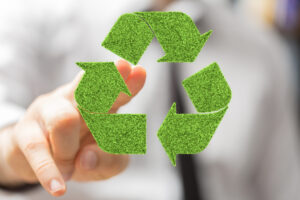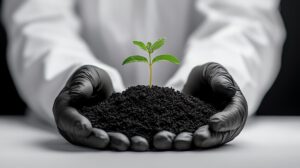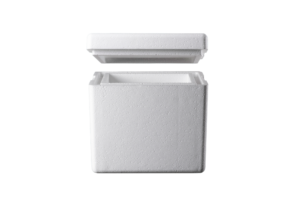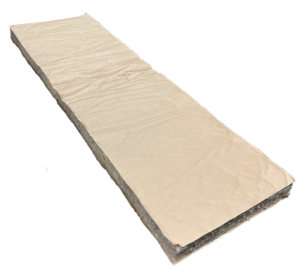As the cold chain packaging industry evolves to meet rising environmental expectations, sustainability has become both a target and a tangle. Companies across the spectrum are working to improve the environmental performance of their products, yet the terminology used to describe those products—terms like recyclable, compostable, biodegradable, curbside, and bio-based—often generates more confusion than clarity.
At EFP, we work with a variety of materials, including traditional expanded polystyrene (EPS) and innovative natural fiber-based insulation like our NatureKool® product line. In our conversations with sustainability leaders, procurement managers, and logistics professionals, one thing is clear: people want to do the right thing, but they’re not always sure what the terminology really means—or what it doesn’t.
This blog post is a preview of an upcoming webinar where we will break down key sustainability terms, assess the attributes of various cold chain packaging products on the market, and offer a clear-eyed look at how to evaluate them responsibly. Our goal is to empower decision-makers with the knowledge to make informed, impactful choices.
Environmental claims are everywhere, but without consistent standards, they can mislead or oversimplify. For example, a product labeled “biodegradable” may sound eco-friendly, but the term doesn’t specify how long it takes to degrade, under what conditions, or into what substances. Similarly, a package marked “recyclable” might not be accepted by any local curbside program.
These terms aren’t just semantics. They influence purchasing decisions, regulatory compliance, end-of-life outcomes, and ultimately, a company’s sustainability reputation.
Let’s look at some of the most commonly used terms in cold chain packaging—and what they actually mean:
Recyclable
This means the material can be processed and reused—in theory. In practice, it depends on local infrastructure, and whether or not there is a “responsible end market” to re-process and re-use the material once it is collected. EPS, for instance, is technically recyclable and accepted at hundreds of drop-off locations in the U.S. In addition, there is a robust market for recaptured EPS with the EPS being used to make a variety of products, including EPS bead with recycled content that can be molded into new products just like virgin material. That said, many municipal curbside programs don’t yet accept EPS due to density and transportation concerns. A product labeled “recyclable” should always be paired with information about how and where it can be recycled.

Curbside Recyclable
This is a more precise term, indicating that the material is accepted in residential recycling bins collected by municipal programs. Common examples include corrugated cardboard, PET bottles and cellulose-based insulation used in EFP’s NatureKool® product. Relatively few cold chain insulation products meet this threshold today.

Compostable
Compostable materials break down into organic matter, water, and CO₂ in a composting environment. However, to claim compostability, a product should meet third-party certifications like ASTM D6400, EN 13432, or BPI Certification. Industrial composting and backyard composting are vastly different; many products require high heat and controlled humidity to break down effectively.

Biodegradable
This broad term simply means the material will eventually break down due to microbial activity. It lacks a defined time frame and environmental conditions. Nearly everything is technically biodegradable given enough time—so this claim, without further detail, is often misleading.

Bio-Based
A bio-based material is derived from renewable biological sources like cellulose, hemp, cotton, sugarcane or corn, rather than fossil fuels. This term refers to the origin of the material, not its end-of-life behavior. A bio-based plastic might still persist for a long time in the environment just like a petroleum-based one.

Sustainable cold chain packaging is about more than just what the material is made of—it’s about the entire lifecycle, including:
In this context, it’s clear that no single metric defines sustainability. Decision-makers need to evaluate trade-offs. For instance, EPS offers excellent thermal insulation with low material weight, which can reduce emissions during transport. On the other hand, fiber-based insulation may offer improved compostability or recyclability but may be heavier or more moisture-sensitive.
A growing number of fiber-based insulation products are entering the market, each with different claims about sustainability. These include materials made from:
Some of these materials are recyclable in curbside paper streams; others are compostable under industrial conditions; a few are merely biodegradable. The packaging may also include non-compostable liners, adhesives, or films that alter the overall profile.

At EFP, we created the NatureKool® line to provide a high-performing, fiber-based alternative with an improved environmental profile. NatureKool® is made from renewable natural fibers and is engineered to deliver robust thermal protection while reducing reliance on plastics and fossil-based materials. It is also:
We’re continuing to assess how NatureKool® performs in real-world disposal scenarios and are actively pursuing third-party certifications where applicable.
Sustainability is not a marketing exercise, it’s a science and systems-based challenge. Companies have a responsibility to substantiate their claims and to help customers understand the best way to handle used packaging. That includes:
EFP believes that innovation must be matched by integrity. As we introduce new materials to the cold chain sector, we are committed to rigorous testing, honest disclosure, and open dialogue with our partners.
In our August webinar, we’ll take a deeper dive into these sustainability terms and explore real-world examples of cold chain packaging—from EPS coolers to natural fiber inserts. We’ll also examine case studies from companies trying to balance sustainability goals with regulatory pressures and supply chain performance.
Whether you’re a logistics manager trying to reduce landfill waste or a sustainability officer drafting your next ESG report, this session will help cut through the noise and focus on what really matters.
Register for our August webinar on Unpacking Sustainability: Understanding Sustainability Terms & Natural Fiber Solutions here —we look forward to seeing you.

Written by Joe Grzyb, Director of Sustainability.
Joe Grzyb (pronounced “Gribb”) has over 25 years of experience in leading, managing, and growing high-tech companies primarily in the temperature-controlled packaging industry. Joe was a Co-Founder of NatureKool® and he now joins EFP as our first-ever Director of Sustainability. Before joining EFP, Joe held positions such as Founder of Aspen Technologies, CEO of Phase Change Energy Solutions, and leadership roles at AmeriTech Exports, ITT Defense and the US Air Force.
Keep up with all the latest EFP News!